Poverty
Sojourners campaigns assistant Anna Hall posted a great piece last week de-bunking 5 myths about the minimum wage. One of these myths — that most minimum wage workers are suburban teenagers — was countered by the facts: nearly two-thirds of minimum wage workers are adult women.
Don’t think of a suburban teenager — think of a single mother working full time while trying to raise her children, care for her family, and make enough to pay rent, probably without any paid sick or personal days (not to mention maternity leave). Could you do that on $15,000 a year?
On Jan. 13, Maria Shriver – who, in addition to her many accomplishments, is the daughter of the statesman widely regarded as the architect of the “War on Poverty” — released a report focusing on the needs of women in the current economy.

The only way to win the “war on poverty” is for liberals and conservatives to make peace — for the sake of the poor. That would be the best way to mark the 50th anniversary of the war on poverty, declared by President Lyndon Johnson in his January 1964 State of the Union address. Making peace means replacing ideologies with solutions that actually solve the problems of poverty. With both Republicans and Democrats speaking out on poverty this week, and the recession slowly receding this should be an opportunity to find the focus, commitment, and strategies that could effectively reduce and ultimately eliminate the shameful facts of poverty in the world’s richest nation.
For any proposal, the basic question must be whether it helps more people and families rise out of poverty and realize their dreams. This means setting aside political self-interest and thinking beyond our too often inflexible ideologies.

It’s a new year, and Congress is back in session.
One of the top issues expected to be debated in 2014 is a hike to the federal minimum wage. 13 states have instituted wage increases. President Obama has supported raising the minimum wage throughout his presidency. Most recently, he shared his approval of new legislation proposed by Sen. Tom Harkin and George Miller (D-Calif.) that would raise the minimum wage to $10.10, up from it’s current $7.25.
Critics of the Harkin/Miller bill are quick to decry any wage increase. The usual arguments are trotted out to combat progressive pay for low-wage earners. Here are five commonly perpetuated myths about minimum wage. Hopefully, their exploration will shed a more accurate light on this contested issue.

IN TERMS, America has tried to heal itself. The Civil War took place in the 1860s. The civil rights movement took place in the 1960s. From America’s two biggest domestic conflicts emerge three main elements: the first, a group of people, primarily white, the majority and ruling group in society. Let’s call this group the “Land of the Free”; the second, also a group of people, but a minority, primarily black, originally from Africa, the “Other America”; and the third element of our simplified history is the slavery and poverty that divides the first group from the second and which we will call the “Wall.” ...
There are several questions I must ask myself if I am to be a Christian in America today. One that gives me a great sense of urgency is this: “If change only comes after confrontation and violence, what type of confrontation is needed to make the country livable for all people?”

TWO OF MY greatest teachers were Latin American men, both ordained as Catholic priests. One, Archbishop Oscar Romero, was assassinated in 1980. I never met him, being a 20-year-old American who’d never set foot in El Salvador or anywhere else in Latin America. But Romero made me, a lapsed Catholic, wonder why his views—our views, if Christian social teaching means anything at all—would be viewed with murderous hostility by the Salvadoran elite. After all, it was all right there in the Book. Wasn’t it?
The truth was, I didn’t know. Was it worth looking at books about these matters? That’s what we believed in medical school: Look it up! So Romero led me to the second of these teachers who, I’m happy to say, is alive and well and living (mostly) in Lima, Peru. Gustavo Gutiérrez, a diminutive and humble Dominican priest and a great friend of Romero’s, taught me through his books, from The Power of the Poor in History toWe Drink from our Own Wells, and later through his friendship and his almost mystical (to me, in any case) optimism.
Over the course of my 20s, the slender, frayed thread of my own faith, which I had believed cut, slowly came back into view. There was a filament a bit stronger than imagined, made visible in part by my Haitian hosts and patients and friends, and in part by Catholic social activists working against poverty in settings as different as tough neighborhoods in Boston, the farms of North Carolina, and the slums of Lima.
Some were nuns or priests, some were engaged laity, from many professions. Most were people living in and struggling against their own and others’ poverty. Their activism taught me a lot about a space in the Catholic Church I’d not seen clearly before, and about the promise of long-term engagement in the monumental struggle against poverty and discrimination in all its forms. That includes gender inequality, no stranger to the institution. Most of the most inspiring activists were women.
IN THE LAST YEAR of his life, Martin Luther King Jr. struggled with what are best understood as existential challenges as he began to move toward an ever-more-profound and radical understanding of what would be required to deal with the nation’s domestic and international problems.
The direction he was exploring, I believe, is far more relevant to the realities we now face than many have realized—or have wanted to realize.
I first met King in 1964 at the Democratic Party’s national convention held that year in Atlantic City—the occasion of an historic challenge by the Mississippi Freedom Democratic Party (MFDP) to the racially segregated and reactionary Mississippi Democratic Party. I was then a very young aide working for Sen. Gaylord Nelson of Wisconsin. Sen. Nelson authorized me to help out in any way I could despite President Lyndon Johnson’s effort to clamp down on the fight for representation in the interest of a “dignified” convention that would nominate him in his own right after his rise to the presidency following President Kennedy’s assassination. Johnson didn’t want a bunch of civil rights activists muddying the waters and, not incidentally, causing him problems in the conservative, race-based Democratic South.
After much back and forth, the Johnson administration offered a “compromise” proposal that the old guard be seated (provided they pledged to support him) and that two at-large representatives of the MFDP also be seated.

In the short three months that I have been at Sojourners as the director of individual giving, I’ve been humbled and inspired by the countless social justice activists who make up our community. In these three months, I have witnessed activism for immigration reform, a vigil for those most affected by congressional dysfunction, organizing for climate change, a prophetic stand for racial justice, the launching of a new campaign to empower women and girls, and much more.

Laying out a blueprint for the issues that are likely to define his papacy, Pope Francis on Tuesday issued a biting critique of capitalism, calling on world leaders to fight against poverty and for the rich to share their wealth, and urging the media to adjust its priorities.
“How can it be that it is not a news item when an elderly homeless person dies of exposure, but it is news when the stock market loses two points?” Francis asked in an 84-page “apostolic exhortation” that is widely seen as a road map for his papacy akin to a presidential State of the Union address.
“How can we continue to stand by when food is thrown away while people are starving?” he asked. “Today, everything comes under the laws of competition and the survival of the fittest, where the powerful feed upon the powerless. As a consequence, masses of people find themselves excluded and marginalized: without possibilities, without any means of escape.”

We are making historic progress against HIV/AIDS: The global rate of new HIV infections has leveled, and the number of annual AIDS deaths has decreased by nearly a third since 2005. Antiretroviral drugs are driving these gains by stopping progression of the disease and, we now know, preventing the spread of HIV infections.
Yet AIDS remains the leading cause of death in sub-Saharan Africa, where poverty limits access to lifesaving treatments and 25 million people are living with HIV—representing 70 percent of cases worldwide. President Barack Obama should be commended for uniting the world behind the goal of creating an AIDS-free generation. I share his passion and believe we can achieve this in the next decade — but only if we accelerate the provision of antiretrovirals to the poorest and most vulnerable people.
The opportunity has never been clearer. New data published in the New England Journal of Medicine project that early treatment with antiretrovirals in South Africa, my home country, would prove very cost-effective over a lifetime (costing $590 per life-year saved) and generate both public health and economic benefits. The World Health Organization now recommends early and preventive treatment with antiretrovirals, including administration to children and uninfected partners of people living with the disease. The WHO estimates that this could save an additional 3 million lives and prevent at least as many new HIV infections through 2025.
When Obama and I met in South Africa in June, I reminded him that, given his deep familial roots in the continent, his success is our success — his failure, our failure. With that in mind, there are two decisions Obama can make before the end of this year to fulfill the promise of an AIDS-free generation.
Still Shining
David Hilfiker is a retired inner-city physician and writer on poverty and politics who has Alzheimer’s. He writes about his experience, with the hope of helping “dispel some of the fear and embarrassment” that surrounds this disease, on his blog “Watching the Lights Go Out.” www.davidhilfiker.blogspot.com
Transported
Laura Mvula is a British, classically trained musician, songwriter, and former choir director whose debut album,Sing to the Moon,is a lush fusion of soul, jazz, gospel, and pop. While not overtly “about” faith, her arrangements are imbued with spiritual longing and visions of beauty. Columbia

Gov. John R. Kasich (R-Ohio) did a shocking thing recently. He broke with his political allies and decided to expand Medicaid to 275,000 poor people in his state through the Affordable Care Act. Then he called a spade a spade, saying: “I’m concerned about the fact there seems to be a war on the poor.”
Kasich’s statement came just two days ago. And today, 47 million low-income Americans will see their food stamps benefits decrease as stimulus funding ends. In light of this newly named “war on the poor,” I’ve been reflecting on Jesus’ story of the Good Samaritan, and the man’s question to Jesus, “Who is my neighbor?” What an intriguing question.
Of course one of the most incredible things about this story is that Jesus never answers the lawyer’s question. Rather, he tells a story about a man beaten by robbers on a dangerous road. He was stripped naked left lying there, clinging to life. Both a priest and Levite pass him by, but a Samaritan went out of his way, broke his usual routine, used up his own gas (or at least his donkey’s energy) to bring the man to an inn. And he took care of him overnight at the inn, offering the innkeeper what would today be about $330.
And then Jesus flips the script! The lawyer asked who exactly is my neighbor? Who do I have to love? And conversely who can I cross off my need-to-love list?
Jesus doesn’t answer the question. Jesus returns his question with a question: “Who was a neighbor to the man who fell into the hands of robbers?”
Nowadays we hardly have a concept of what it means to be a neighbor anymore.
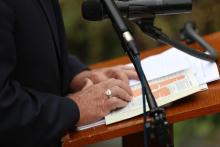
For many, including myself, the past few weeks have been discouraging, given the state of our politics and culture and what many vulnerable people across the country are experiencing. But despite the frustration and even grief sometimes I have been reminded of the importance of “saving faith.”
My favorite Twitter response last week said this, “If all American Christians behaved as you do, I wouldn’t have to be such a huge a**hole of an atheist.” (Edits mine.) It came in response to a column I wrote about the new film, 12 Years A Slave (see it if you haven’t yet!), the continuing realities of racism in America that we still tolerate, and the need for churches to provide leadership in the changing demographics of the country by becoming the multiracial faith communities we were intended to be.
The week before saw many of faith leaders, pastors, and young people out in the rain at the U.S. Capitol during the government shutdown in a “Faithful Filibuster,” reading each day through the 2,000 verses in the Bible that speak of how we should treat the poor and vulnerable. One of those nights a family friend, the father of one of the boys I have coached in Little League baseball, came over to our house. He said, “You know I am an atheist, but I really admire what you are doing at the Capitol — that’s what Christians ought to be doing.”
Right after the government shutdown ended, Sojourners had our annual staff orientation. The program included each staff member telling their story of when and why they came to join us. Listening carefully, I was struck by how many Sojourners staffers recalled times in their lives when they were about to lose their faith, but rediscovered it after stumbling upon Sojourners. In my remarks to them that day, I also told stories of a few of the legion of people who have told me over the years of how they had lost or were about to lose their faith until they heard the messages about a faith that does justice.
It has all reminded me again how Sojourners began.

A few weeks ago, I asked folks on Twitter, and specifically, my colleague Amy Simpson, who has recently published a book on mental illness and the mission of the church:
What do you think about the way people use words like “bipolar,” “crazy,” and “manic” when they really mean “moody,” “energetic,” “quirky” and even “fun?"
It’s part of a pattern I’ve noticed lately — and maybe you’ve noticed it too.
People with beautiful head shots, flawlessly designed websites, and enviable accomplishments insist that they are really just a ‘mess.’ Or that their families are ‘crazy.’ Or that their homes and lives are every bit as complicated and frustrating as everyone else’s … meanwhile, their Instagram feeds show nothing but beauty; if ‘chaos’ is there, it’s only ever of the picturesque kind.
There are no birdcages sprouting stalagmites and stalactites of bird droppings. There are no snotty-nosed, unwashed, half-dressed, hungry children who’ve never visited a dentist in their lives. There is food in the fridge and on the table, and it isn’t even growing mold or crawling with roaches or undulating with maggots. In fact, it’s from Trader Joe’s and may even be organic! There is no broken glass or police officers showing up because the neighbors heard screaming. There is electricity and running water and indoor toilets.
Yeah, there’s raised voices and tempers and conflicts. But that makes you human. Not crazy. Not dysfunctional. Not “a mess.”
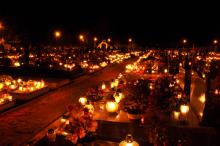
I probably shouldn’t admit how much I like Halloween. I’m too much of a slug to deck out my house, I rarely wear a costume, and I haven’t been to a wild party in years, but I love the excitement children bring to the whole process. Then again, there’s the classic It’s the Great Pumpkin, Charlie Brown – what’s better than that? I’m pretty much a sucker for Halloween.
I was already an adult when I learned how we came upon Halloween. All Hallows’ Eve marks the night before All Hallows’ Day, or All Saints’ Day, when Christians celebrate those who have preceded us in the faith. Some churches honor great heroes of the faith, the “saints” of our past. Other churches emphasize that all believers are “saints,” not because we are especially virtuous but because we are made holy simply by God’s will. In some churches, the label “saints” joins us not only to our deceased forebears but also to our living sisters and brothers scattered around the world. (Still other churches simply don’t observe the day at all.)
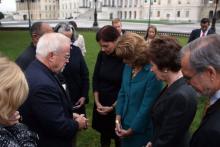
During a sunrise vigil at the U.S. Capitol this morning, three senators unexpectedly joined us. They were all women, all Republican and, it turns out, all Catholic. Sens. Susan Collins of Maine, Lisa Murkowski of Alaska, and Kelly Ayotte of New Hampshire are part of a new 14-senator bipartisan, women-led group engaged in their own kind of vigil: trying to end the government shutdown and prevent the nation from going into debt default.
A chuckling comment from a male colleague in the Senate perhaps expresses a hope in the midst of this incredibly dangerous political crisis: “The women are taking over.” This morning, the senators walked over to thank us for praying for them and the government at this critical moment and told us how much they felt the need for our prayers right now. The looks on their faces showed us the seriousness of their plea for prayers.
People of faith are instructed to pray for their political leaders, and their need has never been more evident in this completely dysfunctional Capitol City. For the seventh day now, faith leaders, pastors, young people, and passersby lifted up prayers for the common good across from the Capitol. Until this morning, there was no response from our elected officials or the national media pundits.
But the #FaithfulFilibuster has taken off across the country through word of mouth and social media — our prayers are trending.

In my lifetime I’ve driven on three roadways named after Martin Luther King, Jr. One was a street, another a boulevard, and the third a highway. And whether by cosmic irony or human design, each of these roadways passes through communities of significant poverty and color, namely black. Around these roadways are boarded up storefronts, crack and heroin dens (think The Wire), condemned row houses, and inevitably, always – public schools.
From 2001 to 2006 I left the safety of the pulpit to teach in the schools of Baltimore and Washington, D.C., pursuing a call to care for the proverbial least of these (it’s always pained me to think how I might feel to be called this, as in hey, you least of these, can I help you with anything? – but that’s a reflection for another time). I left also the safety of a suburban megachurch, where all you needed to do to understand the socioeconomic standing of its members was to walk through the parking lot, and the familiar cultural context of my Korean-American upbringing.
This article, however, is not about me. It’s about beautiful, creative, energetic, and intelligent children — kids who, as the least of these, are too often treated as such. There is no limit to blame: from the mother who comes to school drunk, a prostitute, publically shaming her son (who loves her nonetheless and gets beaten by the other boys defending her honor); to the worn-out teacher who drags a “difficult” child into the bathroom, bruising her arms and threatening her with verbal vitriol and rage; to the administration that promotes student after student, knowing they are years behind, but too old to remain; to the system that maintains, protects, and worships a biblical truism, that for to all those who have, more will be given, and they will have an abundance; but from those who have nothing, even what they have will be taken away (Mt.25:29).

I remember the first time I ever got straight A’s. It was also the last time.
I was in Mrs. Becker’s 4th grade class at John Story Jenks School in Philadelphia. I was always good at reading, I LOVED science projects, and art class was fun — but math? Ugh. Math was my nemesis. In 4thgrade the times tables felt as insurmountable as that dang rope everybody else could whiz up and down in gym class. I just couldn’t figure it out. In fact, to this day, I haven’t figured the rope.
So, my father became my times tables drill sergeant and resorted to straight memorization tactics, making me write each one 10 times. Then he sat across from me at the dining room table and drilled me on the times tables until I said them in my sleep. It was brutal … and oddly, one of the fondest memories of my elementary school years. Not only did I master multiplication, but I also learned something much more important. When my report card came back that quarter with straight A’s, I learned that I could learn!
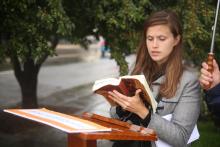
Setting an away email with no date of return was almost as odd as leaving work and not and knowing when I’d be back. This unexpected time off gave me the opportunity to do everything on my to-do list and spend ridiculous amounts of time at the dog park. Naturally, it also gave me time to catch up on reading and visiting with other furloughed friends. But this past Wednesday I was beginning to feel a bit hopeless about the whole situation.
Scrolling through Facebook I noticed Sojourners updates on its #FaithfulFilibuster and it truly made me ashamed of my hopelessness. I was ashamed because I forgot who was in charge. I was ashamed because I forgot where my hope lies. And I was ashamed because I was so wrapped up in my own struggles of furlough I forgot about the families that were already struggling and now also dealing with a loss of paychecks.
On Thursday I saw another update from Sojourners, and despite the rain, I felt compelled to go check it out. I expected to do nothing but observe and admire faith leaders stepping out to reclaim hope and speak for the millions of silenced voices in this country. However, when I arrived, something different happened. I was asked if I wanted to participate, handed a Bible, and stepped to the podium to read.
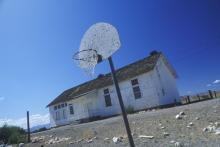
Most Americans share a common understanding that many public schools in poor neighborhoods aren’t great. It’s rare that I engage anyone who doesn’t know this basic fact on some level. But what’s less common is a deeper understanding of the extent of the problem. And sadly, even less common than that? Finding individuals who express a deep conviction that educational inequity can be eliminated. Faith communities are poised to add our voices to this much-needed conversation.
Fifteen million children live in poverty in the United States. Given poverty’s impact, many of these children already face additional challenges in their lives. For many young people, education can be “the great equalizer.” A high quality school can provide students with the necessary foundation to go to college and have a variety of opportunities opened to them. Poverty can become a thing of the past. But students growing up in poverty are more likely to attend low-performing public schools. In fact, only 22 percent of children who have lived in poverty do not graduate from high school. Only 9 percent receive college diplomas. And, not surprisingly, given our nation’s historical intersection of racial injustice and poverty, African American, Latino, and Native American students experience some of the nation’s biggest educational inequities.

Jim Wallis talks about the #FaithfulFilibuster outside the Capitol Building and offers a reading of his conversion text, Matthew 25.